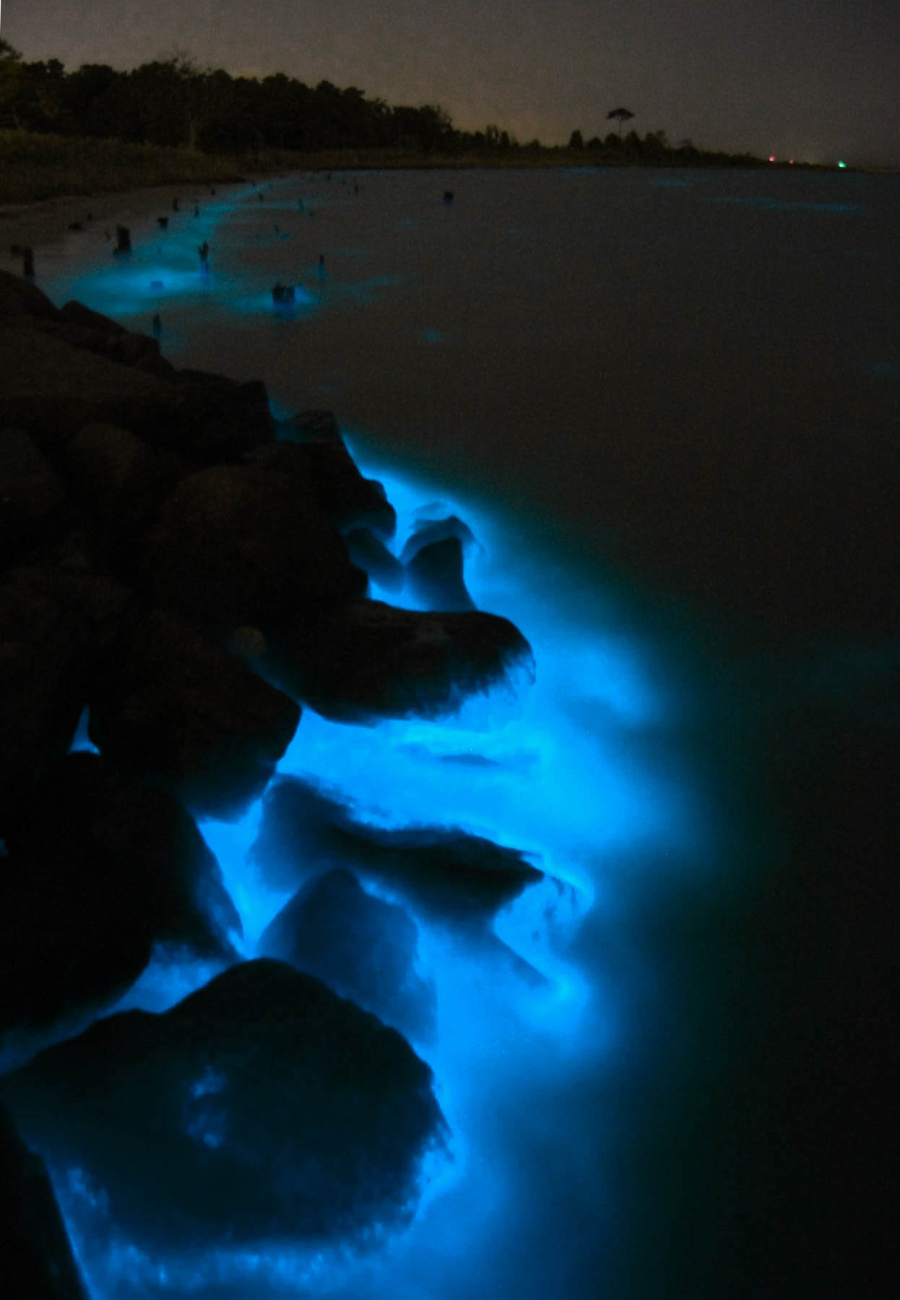Alexandrium monilatum sheds light on a Bay issue
Glowing harmful algal blooms illuminate the problem of nutrient pollution

Have you ever gotten lost, gazing up at the infinite night sky, only to look down and see the glittering reflection of the stars twinkling on the water? Depending on where you are, you might be seeing more than stars—you might be looking at Alexandrium monilatum, a type of photosynthetic algae that glows when stimulated at night by wind, waves or passing ships. However, this beautiful bioluminescent has a dark side. It is a type of harmful algal bloom, fueled by nutrient pollution in the Bay.
Harmful algal blooms form when excess nutrients enter the Bay through wastewater, air pollution and runoff from urban and rural areas. These nutrients cause algae like Alexandrium monilatum to grow quickly, but when they run out of nutrients, they die and decompose. This process of rapid growth, death and decomposition removes dissolved oxygen from the water, something vital for fish, shellfish and other underwater life, leading to what is more commonly known as a “dead zone.” This rapid growth also blocks sunlight from reaching underwater grasses, which combat the effects of harmful algal blooms by absorbing nutrient pollution and releasing oxygen into the water, as well as provide critical habitat for marine life in the Bay.
Additionally, harmful algal blooms block filter-feeders from obtaining food, can produce smelly surface scum and some, like Alexandrium monilatum, even create harmful chemicals that are toxic to humans, wildlife and aquatic life. Researchers are working to understand the dynamics of toxins produced by Alexandrium monilatum, its impact on fish and shellfish, how it can accumulate and transfer up the food web and how it will affect the rapidly expanding shellfish aquaculture industry in the Bay region.
However, not all algae is bad for the Bay. In fact, algae are a vital component of the Bay's ecosystem, providing a food source for small fish and other wildlife. It becomes an issue when nutrient pollution accumulates in the Bay from sources throughout the watershed. The helpful algae becomes overfed with pollution from our lawns, gardens, paved roads, farms, cars, septic systems and wastewater.
The good news is we all can help. We can reduce the amount of runoff we create by capturing rainfall with a green roof, rain garden or rain barrel, absorbing water with permeable pavement, and redirecting the flow of water by adjusting our home downspouts toward grass or gravel rather than paved driveways or sidewalks.
We can also reduce nutrient pollution by carefully fertilizing our gardens and lawns; making sure not to apply fertilizer on dormant lawns, frozen ground or near drainage areas; and using only what you need.
Check out our How-To’s and Tips page for many more ways to help combat nutrient pollution and the spread of Alexandrium monilatum.

Comments
Great question Phoebe: What's the difference between normal gardens and rain gardens. Normal gardens are typically designed to grow food to eat or flowers that people like having in their yard. Rain gardens on the other hand are specially designed to hold rainwater and let it soak into the ground, so it doesn't run off into the streets and gutter. Rain garden are positions near house down spouts, are lower in the ground that typical gardens, and include plants that are especially good at soaking up water.
Thank you for the tips,but I have one question:is there any difference between a normal garden and a rain garden?-Phoebe
This is good, clearly presented information on an important, often-misunderstood problem. Thanks for the suggestions on how to help too.
This is a very informative piece. Thank you for the suggestions on what we can as well as should do.
Thanks for the tips on how to prevent contributing to the problem. One thing I have done, not mentioned, is that I have switched my grass lawn to indigenous moss so that at we no longer need to fertilize, and it requires much less water.
Appreciate the information about nutrient pollution and especially the easy tips on how to personally impact it’s reduction. Thank you
Fascinating topic and extremely well written!
Great piece. Fact filled plus things regular folks can do to help address the issue.
Thank you!
Your comment has been received. Before it can be published, the comment will be reviewed by our team to ensure it adheres with our rules of engagement.
Back to recent stories